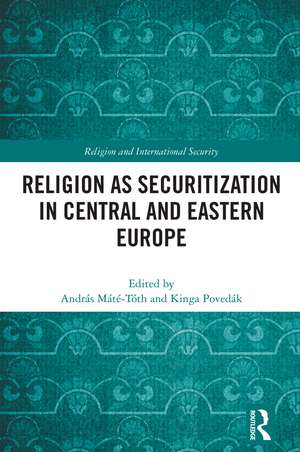Religion as Securitization in Central and Eastern Europe: Religion and International Security
Editat de András Máté-Tóth, Kinga Povedáken Limba Engleză Hardback – 18 sep 2024
It explores contemporary social processes and discourses on security linked to religion and religious institutions. CEE has experienced many confluences of security issues with religious interpretations and world views. For instance, the international refugee and migration crisis could not be separated from the counterpoint between Christianity and Islam in political discussions. Similarly, the debates on LGBT family recognition and the traditional family model are inseparable from the “Christian family” as a reference point. The security needs of the region are particularly acute trigger points, which can be instrumentalized by political power. In other words, the threat sensitivities of collective identity make the region particularly well suited to being a focus of securitization, both from the host side and from the discourses that are enforced from above. In this volume, the authors approach the validity of securitization in relation to religion, and religion itself as securitization, from a broader perspective. They show not only what religious facts and aspects have become threatening in the process of securitization but also that the function of religion in the CEE region can be described and understood primarily as securitization. This unique collection of studies offers a comprehensive theoretical and methodological approach, while the case studies are drawn from more than seven countries in the region, by leading scholars.
The book will be of interest to scholars from a wide range of disciplines including political science, history, anthropology, and religious studies. It will also function as an important introductory work for students to this specific area of research.
Preț: 1003.99 lei
Preț vechi: 1224.37 lei
-18% Nou
Puncte Express: 1506
Preț estimativ în valută:
192.11€ • 200.58$ • 158.100£
192.11€ • 200.58$ • 158.100£
Carte tipărită la comandă
Livrare economică 04-18 aprilie
Preluare comenzi: 021 569.72.76
Specificații
ISBN-13: 9781032462158
ISBN-10: 1032462159
Pagini: 218
Ilustrații: 2
Dimensiuni: 156 x 234 mm
Greutate: 0.56 kg
Ediția:1
Editura: Taylor & Francis
Colecția Routledge
Seria Religion and International Security
Locul publicării:Oxford, United Kingdom
ISBN-10: 1032462159
Pagini: 218
Ilustrații: 2
Dimensiuni: 156 x 234 mm
Greutate: 0.56 kg
Ediția:1
Editura: Taylor & Francis
Colecția Routledge
Seria Religion and International Security
Locul publicării:Oxford, United Kingdom
Public țintă
Academic, Postgraduate, and Undergraduate AdvancedCuprins
Introduction 1. Securitization and the collective victimization – The perspective of Study of Religion 2. Church rhetoric in Hungary since the regime change – A theory-based securitization analysis 3. The Orthodox Church and Russian-Speakers in the Latvian Political Security Discourse 4. Churchification of Muslim religious organizations in South-Eastern Europe and securitization 5. “The Symbol of our Kinship” versus the “Insignia of Our Enslavement” – Struggle for Church’s (In)Dependence amidst the Russian-Ukrainian War 6. Instrumentalised Religion and Securitisation – Possible lessons from the Russian invasion of Ukraine 7. Religion and Social Progressivism in Poland and Slovakia – towards (De)securitization? 8. Securitization and vernacular securitization of religion in communist Hungary 9. Kosovo and Securitization in the Serbian Orthodox Church’s Operational Code
Notă biografică
András Máté-Tóth is the founder of the first Department for the Study of Religion in Hungary, at the University of Szeged. He is the leader of the HUN-REN “Convivence” Religious Pluralism Research Group at the University of Szeged. His main research interests include the mutual interaction between social and religious turns in Central and Eastern Europe and the theoretical interpretation of contemporary religious processes. He is a member of the editorial board of the Journal of Religion in Europe.
Kinga Povedák is a research fellow at the HUN-REN “Convivence” Religious Pluralism Research Group and associate professor at the Department of Ethnology and Cultural Anthropology, University of Szeged. Her research interests include vernacular religiosity during Socialist times, Christianity and popular music, the musical lifeworlds of Christian Roma communities, and Pentecostal-Charismatic Christianity.
Kinga Povedák is a research fellow at the HUN-REN “Convivence” Religious Pluralism Research Group and associate professor at the Department of Ethnology and Cultural Anthropology, University of Szeged. Her research interests include vernacular religiosity during Socialist times, Christianity and popular music, the musical lifeworlds of Christian Roma communities, and Pentecostal-Charismatic Christianity.
Descriere
Religion as Securitization in Central and Eastern Europe examines the significance of securitization theory as a reference point in understanding current religious, socio-cultural, and political processes in Central and Eastern Europe.










